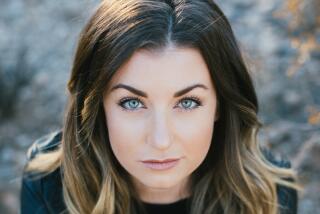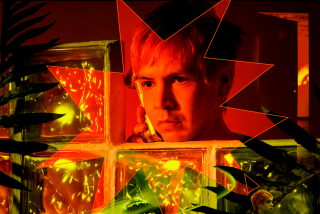‘Tomorrow’ Finally Arrives
More than a year has passed since the blockbuster deal came down. Allan Folsom, struggling screenwriter for nearly three decades, writes his first novel, an international thriller titled “The Day After Tomorrow.” It quickly snags a record-breaking $5 million for various rights, including $1.5 million for the movie and his adaptation of the screenplay.
“That’s the joke,” Folsom, 52, says now. “I had to write a bestseller to get my scripts made.” He’s calling from Paris, the city that inspired “Tomorrow” on his first European trip, in 1990. Published to generally rave reviews, the book debuted on the New York Times bestseller list last week at No. 3. In its second week of publication, Folsom His happy to report, it’s in its fourth printing, with 500,000 copies ordered.
It is also, nearly simultaneously, a movie in progress. Producer Richard Zanuck, after reading the manuscript in a single weekend at his Sun Valley, Ida., home, bought the film rights with wife Lili Fini Zanuck, and co-hosted the recent publication party for the book.
“Every page read like a movie,” says Zanuck, who with his wife produced “Cocoon” and the Oscar winner “Driving Miss Daisy.” “You can read great stories, great books, but they don’t necessarily say movie, movie, movie. This one felt that way from the very beginning.”
The idea for “The Day After Tomorrow” came to Folsom while he was sitting in a Paris cafe, wondering what might happen if a character saw someone who had been important to his life 30 years before. The complex story involves Paul Osborn, a Los Angeles orthopedic surgeon, who finds that the long-cold trail of his father’s murderer leads to much intrigue and a modern-day Dr. Frankenstein.
The Zanucks hope to have the film in theaters by Labor Day weekend, 1995, to coincide with the book’s paperback release. Shooting on location in London, Paris, Zurich and Berlin will demand a substantial budget. Though Lili Zanuck says that “this movie is on the MGM fast track,” in fact it is waiting for a green light from the studio while the Zanucks circulate the first draft of the script among prospective directors.
Already the Hollywood mill has been touting Harrison Ford to play Osborn--yet another desperate doctor role--though the Zanucks refuse to play casting games this early. Other juicy parts include a hard-boiled veteran Los Angeles homicide detective and a beautiful young female French doctor, Osborn’s lover.
All of this has turned Folsom’s head only slightly.
“Neither one of us has had time to reflect on it,” Folsom says of himself and wife Karen. They are on a seven-week European tour publicizing “Tomorrow” and researching his next novel. “It’s been a whirlwind. First the book was bought, then we made the editorial changes, then I turned it into a screenplay. I finished that two weeks ago and hit the road to do this.”
Folsom’s Cinderella story is fueling the dreams of struggling writers and screenwriters everywhere. Struggling with screenplays since the ‘70s, the Brown University graduate managed to bag only a few credits--two episodes of television’s “Hart to Hart” and one movie of the week.
“For the last 30 years, working in this (film) business,” he says, “I’ve always known that I was going to work, but that I was not necessarily going to get paid for it. That major pressure has been relieved. This has given me alternatives that I just didn’t have.”
Other dramatic changes include Karen’s pregnancy and a move from Agoura Hills to a tonier address up the coast. Karen, who supported the efforts of her husband of 15 years with her consulting business, will now pursue motherhood full time. But on the whole, Folsom says they’re being financially conservative. While they could now afford the Ritz, he’s calling from the same hotel at which they previously stayed.
“When you have money for the first time in your life,” Folsom says, “you’re very careful with it. You assume, ‘Hey, this may not happen again.’ ”
After getting the original idea for “The Day After Tomorrow” during the Paris visit, details for the book’s extensive European settings were filled in after Folsom returned to Los Angeles, where he put to use skills learned as a documentary filmmaker with David Wolper in the ‘60s.
“Doing documentaries, you worked from subject to subject,” he says. “You learn how to do those things in the most straightforward fashion. You open a book, pick up the phone. The people in the Swiss National Tourist Office were terrific. I’d call them up and ask them about a railroad station, what does it look like, basic questions.”
Most reviews have been enthusiastic, although Entertainment Weekly dismissed it as a mere “ingenious gimmick.”
Folsom can afford to ignore them all. “The main review was from Little, Brown, when they said, ‘Here’s $2 million for it.”’
Meanwhile, Folsom is working on his next novel, the details of which he declines to offer. Like the first, he’s writing it on spec. “I could have gotten an advance,” he says, “but I decided not to. That way I don’t have anyone looking over my shoulder. That’s not a good way for me to work.”
By now, he should know.
More to Read
Sign up for our Book Club newsletter
Get the latest news, events and more from the Los Angeles Times Book Club, and help us get L.A. reading and talking.
You may occasionally receive promotional content from the Los Angeles Times.







